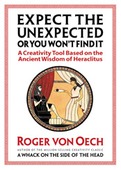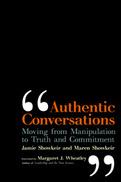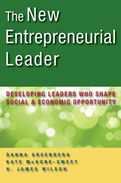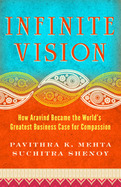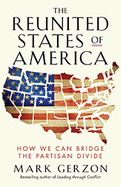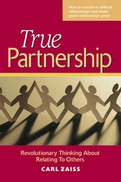Open your mind with the creative enigmas of Heraclitus. These innovation strategies-from "You Can't Step in the Same River Twice" to "Dogs Bark at What they Don't Understand"-are as relevant today as they were 2,500 years ago when this provocative Greek phoilosopher wrote them.
Roger von Oech breathes fresh life into these ancient ideas to produce a treasury of useful creativity insights including "Appreciate Turbulence," "Practice Forgetting," "Ask a Fool," "See the Obvious," "Connect the Unconnected," "Find a Pattern," "Use What's not There," and "Reverse Assumptions."
Whether you read it from start to finish as a creativity workbook, or consult it as a daily oracle, Expect the Unexpected or You Won't Find It offers a welcome jolt to the imagination!
- Written by the bestselling creativity author of all time-von Oech's A Whack on the Side of the Head has sold more than 1.5 million copies
- Provides new approaches to problem solving that anyone can use: managers, students, artists, writers, teachers, and others
- Draws on science, business, history, popular culture, and literature to provide novel solutions to even the most intractable problems
Describes three principles that form the basis for entrepreneurial leadership, a new leadership approach for today's world
- Describes three principles that form the basis for entrepreneurial leadership, a new leadership approach better suited to the realities of today's complex and changing world
- Offers management educators concrete examples of how to incorporate these principles into their curricula
- Based on two years of research at Babson College, one of the top business schools in the world
In years past, the keywords for leaders were confidence, single-minded purpose, and strategic planning. But today's vastly complex, globalized, and fast-evolving world requires a different kind of leadership. This game-changing book details a new approach-entrepreneurial leadership-developed at Babson College, the number-one school for entrepreneurship in the world.
Entrepreneurial leadership is inspired by, but is separate from, entrepreneurship. It is a leadership approach that can be applied in any organizational situation, not just start-ups. Based on two years of extensive research, it embraces three principles that add up to nothing less than a fundamentally new worldview of business and a new logic of decision making.
The authors discovered that rapid change and increasing uncertainty require leaders to be "cognitively ambidextrous," able to shift between traditional "prediction logic" (choosing actions based on analysis of known trends) and "creation logic" (taking action despite considerable unknowns). Guiding this different way of thinking and acting is a different worldview of business and society, where simultaneous creation of social, environmental, and economic value is the order of the day. Entrepreneurial leaders also leverage their understanding of themselves and their social context to guide effective action.
Danna Greenberg, Kate McKone-Sweet, and H. James Wilson, along with some of the top faculty at Babson, examine the three facets of this new model in detail. Each chapter offers concrete examples of how educators across all disciplines are integrating these ideas into their courses-and even their entire curricula. The New Entrepreneurial Leader lays out a comprehensive new paradigm for reinventing management education in order to mold leaders who will shape social and economic opportunity.
2011
Explores the inspiring paradox of an extraordinary business that breaks all the rules.
When a crippling disease shattered his lifelong ambition, Dr. V (Venkataswamy) chose an impossible new dream: to cure the world of blindness. The tiny clinic he founded in India defied conventional business logic and is now the largest provider of eye care on the planet.At Aravind, patients choose whether to pay or not. Millions are treated for free, yet the organization remains stunningly self-reliant. Serving everyone from penniless farmers to the president, it delivers world-class outcomes at less than a hundredth of what similar services cost in advanced nations. Its model is emulated by organizations everywhere from Rwanda to San Francisco.
Infinite Vision uncovers the radical principles behind Aravind's baffling success. Charged with profound insights and stories, it draws readers to the heart of Dr. V's selfless vision, proving how choices that seem quixotic can, when executed with compassion and integrity, yield incredible results—results that can light the eyes of millions.
In this era of poisonous partisanship, The Reunited States of America is a lifesaving antidote. At a time when loyalty to party seems to be overpowering love of country, it not only explains how we can bridge the partisan divide but also tells the untold story of how our fellow citizens already are doing it.
This book, a manifesto for a movement to reunite America, will help us put a stop to the seemingly endless Left-Right fistfight while honoring the vital role of healthy political debate. Mark Gerzon describes how citizens all over the country—Republicans, Democrats, and independents—are finding common ground on some of the most divisive and difficult issues we face today.
2002
"We are all capable of producing more than we typically do. The very nature of our relationships undermines individual and organizational effectiveness." With this uncompromising statement, author Carl Zaiss takes us on an inspiring journey that opens the door to unprecedented levels of individual and organizational performance.
Written for today's complex business arena and rapidly changing world, True Partnership - Revolutionary Thinking About Relating To Others, presents an in-depth look at this mind-altering new perspective for moving beyond the issues and constraints we all face as individuals and groups. It provides a provocative and spellbinding look at how what we take for granted actually sabotages our efforts at improving our own effectiveness and the productivity of the businesses, institutions, and organizations to which we belong.
True Partnership exposes the personal, organizational, and social costs of "the drift." The instinctive and taken-for-granted way of relating limits our effectiveness. The book exposes the four mistaken beliefs that form the drift and keep us from building productive relationships: seeing ourselves as separate and autonomous, relating to others through power and control, having an either/or mentality, and seeing the world as fixed and predetermined. Without distinguishing these four characteristics of the drift, they become our blind spot and sabotage any attempt at improving our effectiveness.
One of the common strategies for improving our ability to live and work together is to build a partnership. It refers to a relationship between people with an emphasis on teamwork and collaboration. Yet, most of what we call partnership is not and most partnerships do not access what is really possible. Due to the drift - the underlying nature of our relationships - our partnerships are often superficial and cosmetic.
True Partnership presents a new perspective, a new context, for our relationships generated by a fundamental shift in the way we, as individuals see the world. True partnership is a state of mind, not a type of relationship. It is a framework of relating to others that has an impact on each and every interaction. The four principles of true partnership include: seeing ourselves as interdependent parts of the whole, connecting to others through communication, operating from a both/and mentality, and relating to our world as observer-created.
True Partnership provides access to highly effective relationships and extraordinary levels of performance. This book challenges people to rethink their basic assumptions and adopt a revolutionary new mindset about their relationships and how they go about producing results at work and at home.
True Partnership is a powerful tool for anyone concerned about improving individual and organizational excellence.
- Shows how, by focusing on the quality of our relationships with people rather than trying to manipulate them into serving our purposes, we can actually achieve more of our goals.
- Exposes the limitations of traditional performance improvement strategies.
- Offers a deeper understanding of the often used but seldom understood term "partnership".
- Provides a wealth of examples and real-life stories showing how this new framework has provided people with extraordinary levels of satisfaction and accomplishment.


